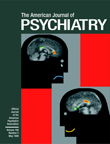Posttraumatic Stress Disorder and Outcomes for Functioning and Quality of Life
To the Editor: Douglas F. Zatzick, M.D., et al. (1) have confirmed the well-known empirical observation that posttraumatic stress disorder (PTSD) “may well be the core disorder contributing to any observed functional impairments or diminished quality of life” (p. 1694). As the authors indicate, their findings are not limited to combat veterans but—other things being equal—may apply to a civilian population, in keeping with DSM-IV (309.81).
In a career spanning over six decades, I have seen thousands of people receiving disability compensation. On the basis of this experience, I propose the following statements:
1. Neither the symptoms nor the management of PTSD has changed in the 150 years since the courts of law became involved; only the names have changed: railway spine, Erichsen’s disease, traumatic neurosis, accident neurosis, compensation neurosis, litigation neurosis, or chronic or delayed PTSD.
2. In no other psychiatric disorder are as many professionals involved as in PTSD: physicians in various specialities, including psychiatry and neurology, psychologists, lawyers, social workers, chiropractors—to name but a few.
Friedrich Jolly in 1897 (2) and Albin Hoffman in 1891 (3), among others, stated that it is not the often trivial accident but rather the law that triggers the development of this condition, and Hoffman recommended changes in the law rather than medical treatment. In 1974, I coined the term “nomogenic disorders” (4, 5) to characterize psychopathological conditions created, enhanced, and perpetuated by the law and its application and to denote the psychological and social consequences of the law in the way it affects the course of the disease. My experience confirms Zatzick and associates’ findings of the often disastrous consequences of PTSD, the way it affects a person and his or her environment, and the futility of any type of treatment of a condition that is not medical but social and legal. Following the resolution of a claim, the person with PTSD maintains the sick role. Bursten and D’Esopo (6) described this as “the obligation to remain sick.” This also applies to pain, described by F. Dudley Hart as “an old friend” (7). The search for further medical attention is abandoned.
In my opinion, the only rational approach is prevention, which consists of shortening the entire compensation claims process from the outset. The medical profession contributes to the complex process by applying countless tests and therapeutic methods in the misguided intention of helping the patient, thus making PTSD an iatrogenic disorder.
1. Zatzick DF, Marmar CR, Weiss DS, Browner WS, Metzler TJ, Golding JM, Stewart A, Schlenger WE, Wells KB: Posttraumatic stress disorder and functioning and quality of life outcomes in a nationally representative sample of male Vietnam veterans. Am J Psychiatry 1997; 154:1690–1695Google Scholar
2. Jolly F: Ueber Unfallverletzung und Muskelatrophie, nebst Bemerkungen ueber die Unfallsgesetzgebung. Berl Klin Wochenschr 1897; 34:241–242Google Scholar
3. Hoffman FA: Die traumatische Neurose und das Unfallversicherungsgesetz. Leipzig, Germany, Sammlung klinischer Vortraege, 1891, pp 155–178Google Scholar
4. Tyndel M: Offenders without victims? in Victimology: A New Focus, vol 1. Edited by Drapkin I, Viano E. Lexington, Mass, Lexington Books, 1974, pp 55–62Google Scholar
5. Tyndel M: The concept of nomogenic disorders. Med Law 1988; 7:167–176Medline, Google Scholar
6. Bursten B, D’Esopo R: The obligation to remain sick. Arch Gen Psychiatry 1965; 12:102–106Crossref, Google Scholar
7. Hart FD: Pain as an old friend. Br Med J 1979: 1:1405S–1407SGoogle Scholar



